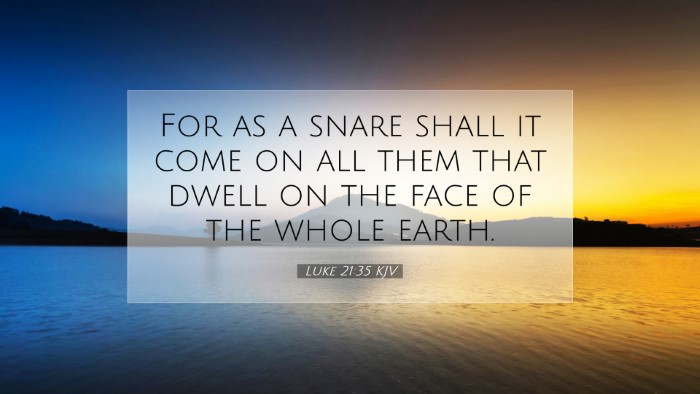Commentary on Luke 21:35
Verse Text: "For as a snare shall it come on all them that dwell on the face of the whole earth."
Introduction
The words of Jesus in Luke 21:35 serve as a profound warning concerning the suddenness and unexpectedness of His return and the coming judgment. This verse is part of His Olivet Discourse, wherein Jesus speaks of the destruction of the Temple, the signs of the end times, and the final judgment. Understanding this verse necessitates a careful analysis of its context and implications within the broader narrative of Scripture.
Matthew Henry's Commentary
Matthew Henry cautions that the imagery of a snare vividly illustrates the danger of spiritual complacency and unawareness. He notes that the phrase "on all them that dwell on the face of the whole earth" emphasizes the universality of this warning; it applies to all, regardless of their perceived spiritual state or readiness. Henry elucidates that many will be caught off guard by the suddenness of events when they come, just as a snare catches an unsuspecting animal.
Henry further encourages believers to be vigilant and to remain in a state of readiness, as the "snare" pertains particularly to those who are not watchful. He contrasts the fate of the unprepared with that of the faithful, reminding readers that constant vigilance and preparedness in faith can shield one from such a trap.
Albert Barnes's Commentary
Albert Barnes elaborates on the significance of the word “snare,” which indicates a trap that is not easily perceived until it is too late. Barnes highlights the inevitability of the events that will unfold and underscores the importance of discernment among believers. He explains that the phrase “shall come” suggests that these occurrences are certain, akin to a legal decree that cannot be annulled.
In Barnes's view, the "snare" encompasses both the judgment on Jerusalem and the ultimate judgment at the end of the world. He stresses the need for constant awareness and preparation among Christians, indicating that daily life can distract many from the urgency of their spiritual state. His call to action for believers is clear: maintain readiness and guard against spiritual lethargy that can lead to moral decay.
Adam Clarke's Commentary
Adam Clarke offers a scholarly perspective that further contemplates the wider implications of the statement regarding the snare. He suggests that the reference to the “face of the whole earth” correlates with the global consequences of sin, thereby extending the scope of Jesus's warning. Clarke underscores the humility with which believers should approach the subject, acknowledging the potential of being ensnared like others if vigilance is not upheld.
Clarke points out that the urgency of the message is rooted in the foreboding tone of the passage, signifying both a call to repentance and an affirmation of hope. He articulates that while danger looms and snares are set, God's grace empowers believers to resist and to prepare for the ultimate redemption that lies ahead. Clarke’s reflections invite a deeper, more personal engagement with the call of Christ through prayer and repentance.
Theological Implications
This verse carries significant theological weight, particularly in the areas of eschatology and soteriology. The mention of a "snare" reveals God's justice and the reality of divine judgment. The universal scope of the warning illustrates that all are accountable for their responses to the gospel. This passage speaks directly to the need for self-examination in light of Christ’s imminent return.
- Watchfulness: The imperative call to be vigilant reinforces the necessity of a continuous and deliberate engagement with one’s faith journey.
- Universal Accountability: The message serves as a reminder that all individuals face the reality of judgment; spiritual apathy can ensnare a soul unexpectedly.
- The Role of Grace: Amidst the warning, there lies a promise of grace for those who choose conditions of alertness and faithfulness in their walk with God.
Practical Applications
For pastors, students, theologians, and scholars, Luke 21:35 is a call to leadership and faith that demands practical applications:
- **Preparation in Ministries:** Encourage congregations to seek deeper relationships with Christ and to remain in a state of readiness through consistent teaching and discipleship.
- **Creating Awareness:** Develop resources and sermons that address the reality of Christ’s return, ensuring that congregants understand the urgency of spiritual vigilance.
- **Personal Reflection:** Engage in regular reflection and self-examination to identify areas of spiritual lethargy and to cultivate a heart that is responsive to the Holy Spirit’s leading.
- **Community Engagement:** Foster a community that holds one another accountable for their spiritual health, encouraging mutual support in the pursuit of holiness.
Conclusion
In conclusion, Luke 21:35 serves as a powerful exhortation to believers in all walks of life, reminding them of the suddenness of divine judgment and the importance of being watchful. Through the combined insights of Matthew Henry, Albert Barnes, and Adam Clarke, we gain a multidimensional understanding of the text, one that calls both for vigilance and hope. In a world that is increasingly distracted and complacent, this verse beckons believers to live with purpose, grounded in the truths of Scripture, and to be faithful stewards of their faith.


